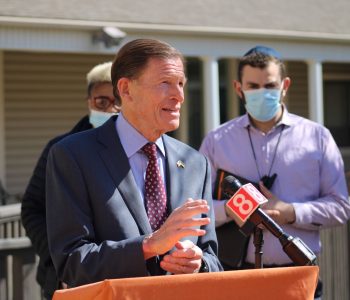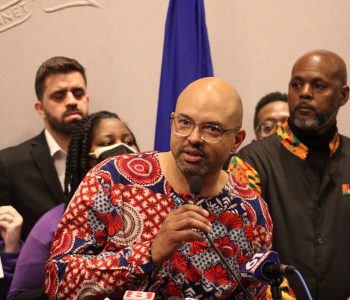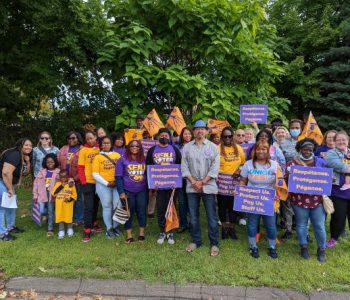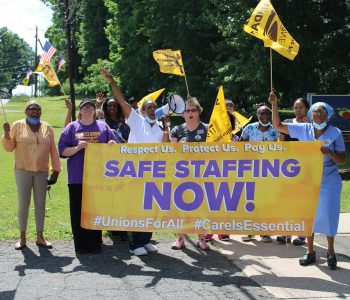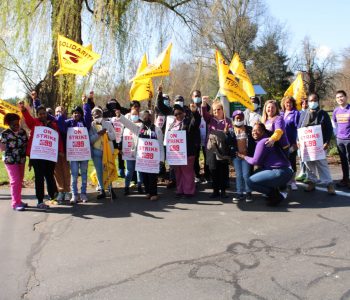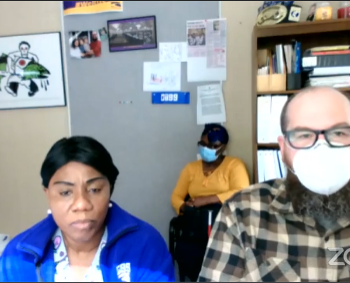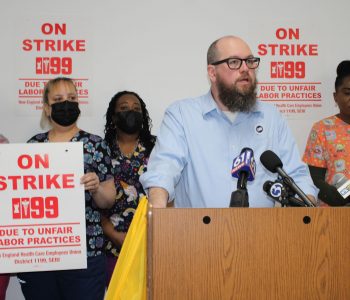As a shuttle bus driver at Yale New Haven Hospital, Denise Rogers constantly came in close contact with nurses and other health care workers as the coronavirus pandemic was spreading swiftly.
She eventually contracted COVID-19 herself after spending all day in her full-time job in the enclosed vehicle. But when Rogers tried to receive workers compensation benefits, she said she was denied after being unable to say exactly who gave her the coronavirus or prove precisely where she contracted the disease.
Rogers, a New Haven resident who works for a transportation contractor, testified Wednesday during a special joint hearing of the legislature’s labor and insurance committees. The legislators are debating whether to change the law so there would be a presumption that essential workers contracted the coronavirus while they were on the job and should be entitled to benefits.
“I showed up and did my job, and now I’m going through the worst time of my life,” Rogers testified. “I bought my own disinfectant wipes, Lysol spray, but it wasn’t enough. … My last paycheck was on March 17. I’m out of sick time. I’m out of vacation time. … Because I couldn’t tell them who I got it from, they denied my case.”
Advocates want the state legislature to update the law during a special session in July so that workers would receive the benefit of the doubt and qualify for compensation. No dates have been announced for the session, but lawmakers are currently being asked which days they will be available in the week immediately following the July 4 holiday. While advocates originally wanted Gov. Ned Lamont to resolve the issue with an executive order, they say the order could not be imposed retroactively to help the impacted workers.
But Joseph Brennan, chief executive officer of the 10,000-member Connecticut Business and Industry Association, told legislators that changing the law could open the floodgates to a series of new claims. Many business owners are concerned about more litigation and delays in the system and are opposed to adding another new law.
“It’s a slippery slope,” Brennan said. “There’s no question about it. … Then you end up where every manufacturing employee that may have gotten it at a grocery store or visiting somebody at a nursing home before those visits were banned [qualifies for benefits]. I don’t know where that line is.”
Joy Avallone, an attorney for the Insurance Association of Connecticut, said there needs to be “a balancing game” between workers and employers.
But some Democratic legislators and the workers themselves believe the issue is straightforward.
“Yes, I believe without a doubt that I contracted it from my job,” said Rogers, who drives workers on the Yale and St. Raphael hospital campuses.
Rogers ended up in the hospital in critical condition, but her husband of 20 years, Howard, also contracted the illness and later died.
“The presumption should be that when a worker in any of these categories acquires the illness it should be presumed to be work-related,” said Senate President Pro Tem Martin Looney, D-New Haven. “The burden should not be on the worker to prove how they got the virus. It should be a presumption in their favor and not be a contested issue.”
Lamont, though, has not made any moves to change the system, despite requests. Max Reiss, Lamont’s chief spokesman, said, “He supports the existing workers’ comp system. We’re not advocating any change in the short term.‘’
Several legislators said at the joint hearing that they understand the issue personally because they have relatives and constituents who recently became ill due to their jobs.
“My brother is a police officer who contracted COVID during this crisis,” said state Rep. Sean Scanlon, a Guilford Democrat who co-chairs the insurance committee. ”That story is not unique. That story can be replicated many, many times across the state.”
Rep. Robyn Porter, a New Haven Democrat who co-chairs the labor committee, said, “My sister got COVID — being a worker at a nursing home in New Haven.”
Lawmakers are looking at the issue around the country, and California, Arkansas and Utah have worked to shift the presumption in the workers’ cases, said Sen. Matt Lesser, a Middletown Democrat and insurance committee co-chair. California Gov. Gavin Newsom recently signed a two-month executive order that declared that essential workers can now obtain benefits without specific proof that the disease was contracted on the job.
Another worker who testified said she got sick on the job at a nursing home with ill patients. Dori Harrington, a licensed practical nurse at a Hartford nursing home, said the fatigue was intense. A single mother with two teenage sons, she said that she has since returned to work.
“During my illness, I wound up being out for five weeks,” Harrington said. “It’s an extreme fatigue. I’ve never been so fatigued in my life. … I had to borrow sick time. I was able to borrow 70-plus hours. I now owe my employer time. … I was taking care of COVID positive patients. I am absolutely certain that I got it from my patients.”
Rob Baril, president of the SEIU 1199NE union that represents nursing home workers, said it was “absolute absurdity” that his members were being challenged in their requests for compensation.
“It seems like a science fiction movie or a bad satire where 50/80/100% of the residents and 25% of the staff is sick with COVID-19 and they fill out workmen’s compensation claims to deal with out-of-pocket expenses, and their applications are denied because they are told they can’t prove they got the virus in the facility,” he said.
Stephen Morelli, chairman of the state Workers’ Compensation Commission, said the “overwhelming majority” of claims — as many as 90% — are resolved without a hearing in front of the commission. Currently, there are 739 claims related to COVID-19, and only 29 have resulted in hearing requests, he said. He said he could not comment on the testimony of the workers who testified, but added that any cases reaching the commission will be handled fairly.
“We will adjudicate it in terms of the statute and the law,” Morelli said.
Article from The Hartford Courant
